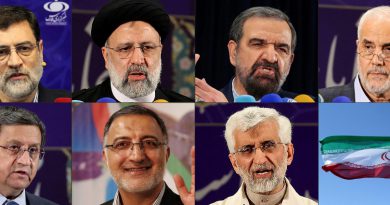Iran’s regime dissolves morality police, not the IRGC or Basij
One of the reasons the regime has decided to dissolve the morality police is that its practices have eaten away at the regime’s already dwindling popularity
Mohammad Jafar Montazeri, Tehran’s Public Prosecutor, announced the dissolution of the Iranian regime’s morality police on Sunday, an unexpected move that came after more than two months of popular protests. The device has come under fire after it killed Mahsa Amini, a 22-year-old Kurdish woman in police custody. Her death on September 16, 2022, sparked nationwide outrage, highlighting the role and practices of Iran’s morality police. Protests have been going on for two and a half months. Finally, the regime appears to yield to the protesters’ rage, deciding to disband the apparatus. However, several questions about the regime’s true intentions arise as a result of this move: Is this a strategic or tactical decision? Is the regime genuinely trying to reform its repressive apparatus? Or is it simply a tactical retreat to appease and calm down the enraged protesters on the streets and send a message that the regime’s course of repression is reversing?
First, let’s look at the history and circumstances surrounding the establishment of the morality police as well as the powers vested in them. Morality police, in its current form, was established in 2005—more than two decades after establishing the other military apparatuses of the regime such as the IRGC and Basij (founded in May 1979 and April 1980 respectively).
Thus, the morality police wasn’t the first repressive apparatus to be created by ayatollahs following their ascent to power in Iran. However, repression had started long ago. It’s almost as old as the revolution itself. In the early years after Iran’s Islamic revolution, the government imposed strict restrictions on men who wore bracelets and necklaces, unusual haircuts, Western-style shirts, or long hair. It also began to restrict women who wear bright clothing and apply make-up in public. Despite the restrictions in place at the time, they were not widespread or draconian.
The morality police are thought to be made up of Basij members. It is a paramilitary unit that is extremely conservative. Its role changed depending on the president’s party affiliation. Women, for example, had enjoyed significant personal freedom under reformist president Mohammad Khatami since he reined in the apparatus’ excesses. This mood had shifted under his predecessor, Mahmoud Ahmadinejad, a populist conservative leader who represented the polar opposite of his predecessor. Similarly, Ahmadinejad’s successor, reformist Hassan Rouhani, limited the power of the morality police. On December 30, 2017, Rouhani issued an order instructing morality police not to arrest or molest women who walk around public places without headscarves. He also barred the apparatus from bringing legal action against them.
The morality police are an unpopular security service in Iran. Iranians believe that morality police endanger women in the country and suffocate their freedom. It’s even despised by men who prefer unusual haircuts. Fear of the morality police drove the Iranians to develop “Gasht-e Ershad,” an application that helps them detect and avoid morality police patrols.
All of the Iranian regime’s security services and apparatuses, including the IRGC, Basij, regular police, army, and morality police, are repressive and use ruthless crackdowns on the people when popular protests grip the country from time to time. One of the reasons the regime has decided to dissolve the morality police is that its practices have eaten away at the regime’s already dwindling popularity. This apparatus directly interacts and clashes with the people, inciting anger and dissatisfaction.
Thus, the regime has legitimate reasons to dissolve this apparatus, including 1) calming popular anger. 2) the morality police’s insignificant power in comparison to other repressive security apparatuses such as the IRGC and Basij 3) the close interaction between the morality police and the people, which causes anger to spread quickly among Iranians, further depriving the regime of its support base. Therefore, the regime disbanded the morality police to prevent its popularity from plummeting further. The regime believes that it is sufficient for the people to bear the economic consequences of its expansionist policies and the waste of state resources on extraterritorial misadventures. The morality police and economic hardships would be too much for the Iranians to bear. Additionally, the morality police, by killing Mahsa Amini, have exceeded all redlines. The apparatus isn’t authorized to kill. When a violator, of dress code or hijab, is arrested, he or she is transferred to a house of correction, where they receive some guidance and advice. The offenders are always released one day following their arrest. This didn’t happen with Mahsa Amini, who was unjustifiably detained and killed—apparently immorally at the hands of’ the ‘morality police’.
Furthermore, the regime maintains its security apparatuses and services. More importantly, the dissolution of the morality police should not be overstated. It’s a wise step back by a pragmatic regime seeking survival amid domestic upheaval caused by economic woes. We would only consider a radical change if Iran’s ayatollahs decided to dissolve the IRGC or the Basij. Before this happens—which will never happen—all of the steps taken are merely tactical maneuvers to avoid downfall.
Mostapha Hassan Abdelwahab is the former editorial manager of the English edition of the Baghdad Post. He is focusing on Iraq, Iran and political Islam movements, with articles posted on the Herald Report, Vocal Europe, the Greater Middle East and other platforms.
Disclaimer: Views expressed by writers in this section are their own and do not reflect Milli Chronicle’s point-of-view.



